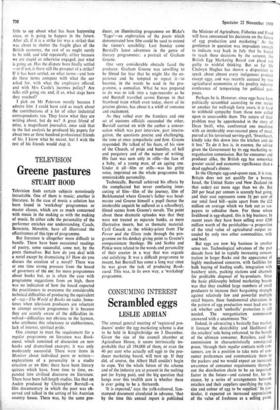Greene pastures
TELEVISION STUART HOOD
Television finds certain subjects notoriously intractable. One of them is music; another is literature. In the case of music a solution has been found in 'workshop' programmes or master classes, which are as much concerned with music in the making as with the making of music. In either cafe the personality of the performer enriches our understanding. Casals, Bernstein, Menuhin, have all illustrated the effectiveness of this type of programme.
But literature is altogether more difficult to handle. There have been occasional readings of poetry, some successful, some not, by the poets themselves. But how do you deal with a novel except by dramatising it? How do you discuss the creation of a novel? There was at one time strong pressure from the board of governors of the Bac for more programmes about books but, as is often the case with programme suggestions from on high, there was no indication of how the board expected the practitioners to overcome the considerable technical difficulties of producing the equivalent of—say—The World of Books on radio. Some- times when television producers are reluctant to attempt certain programmes it is because they are acutely aware of the difficulties in- volved—difficulties not obvious to the layman, who attributes this reluctance to stubbornness, lack of interest, spiritual pride.
One attempt to meet the requirement for a regular programme on literature was Book- stand, which consisted of discussion on new books and dramatised excerpts; it was only moderately successful. There were items in Monitor about individual poets or writers— explorations of a personality in a studio situation or on film; there have been literary quizzes which have, from time to time, ex- panded into civilised discourse on literature. There have been full-length studies, like that on Auden produced by Christopher Burstall—a film documentary in which the poet was ob- served and talked in the setting of his Austrian country house. There was, by the same pro- ducer, an illuminating programme on Blake's `Tyger'—an exploration of the poem which demonstrated how film could be used to extend the viewer's sensibility. Last Sunday came Burstall's latest adventure in the genre of literary programmes : a portrait of Graham Greene.
One very considerable obstacle faced the producer. Graham Greene was unwilling to be filmed for fear that he might like the ex- perience and be tempted to repeat it—to become, in the words he used in the pro- gramme, a comedian. What he was prepared to do was to talk into a tape-recorder as he and Burstall travelled across Europe in that Stamboul train which even today, shorn of its pristine glories, has about it a whiff of romance and excitement.
As they rolled over the frontiers and one set of customs officials succeeded the other, Burstall carried on with the author a conver- sation which was part interview, part interro- gation, the questions precise, and challenging, the tone at once sympathetic and firm. Greene responded. He talked of his fears, of his view of the Church, of pride and humility, of hell and purgatory and of the nature of writing. His face was seen only in stills—the face of a baby, of a young man, of an ageing one. Under it all—film or stills—was his gritty voice, imprinted on the whole programme his unmistakable personality.
Technically, Burstall achieved his effects by the complicated but never confusing inter- cutting of film—film of the journey, film of Berkhamsted where Greene's father was head- master and Greene himself a pupil (hence the intolerable anguish he suffered as a schoolboy), filmed scenes from Greene's novels. The point about these dramatic episodes was that they, were not treated as separate hunks, as mere illustrative inserts, but as thematic material. Cyril Cusack as the whisky-priest from The Power and the Glory rode through the pro- gramme on his donkey giving point to Greene's compassionate theology. He and Scobie and _Pinkie were related to the words and personality of their creator in a way that was organic and satisfying. It was a difficult programme to mount, but Burstall has come a long way since he was given the task of producing Book- stand. This was, in its own way, a 'workshop' programme.


































 Previous page
Previous page